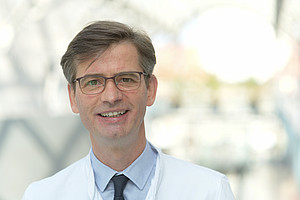Appointment to Professorship for Radio oncology and Radiotherapy

Berlin, 01.04.2022 – Prof. Dr. Daniel Zips has taken over the professorship for radiooncology and radiotherapy today. This is associated with the management of the Department of Radiooncology and Radiotherapy at the Benjamin Franklin Campus and the Virchow-Klinikum Campus as well as at the Charité Mitte Campus (Experimental Radiooncological Research). Prof. Zips moves from Tübingen to the Spree and succeeds Prof. Dr. Volker Budach, who has held the professorship since 1993 and is now retiring.
Prof. Zips is a specialist in radiotherapy and was most recently Medical Director of the University Clinic for Radiooncology in Tübingen and Professor of Radiooncology at Eberhard Karls University. The 51-year-old is looking forward to his move to the Charité, where he also completed part of his studies: “Berlin’s university medicine and the important research landscape in the region are strong attractions for scientists from Germany and all over the world. In addition, the Clinic for Radiooncology and Radiotherapy at Charité is one of the most traditional hospitals in Germany.” He adds: “For me, an important goal in every treatment – and also in research – is the individualisation of cancer therapy. With our medical qualifications, experience and state-of-the-art radiation equipment, we want to provide the best possible therapy for our patients in each case.”
Teaching is also a special concern for Prof. Zips: “Imparting knowledge and experience to future doctors is very important to me and gives me great pleasure. I want to educate and support our students well. This also includes the art of medical conversation, because we often have to give patients bad news. The important thing is to find good solutions together and to maintain the quality of life as best as possible.”
Short vita
Prof. Daniel Zips was born on 23 August 1970 in Dippoldiswalde. After graduating from high school in Dresden, he studied human medicine in Berlin and Dresden from 1991 to 1997. This was followed by scientific work at the radiation biology laboratory of the TU Dresden from 1997. In 1999, Prof. Zips began five years of further training there to become a specialist in radiotherapy, and in 2000 he received his doctorate in pathological biochemistry. In 2006, he also completed his habilitation in Dresden and was appointed senior physician. In the same year, Prof. Zips started as a research group leader for experimental radiotherapy of tumours at TU Dresden. From 2010 until spring 2012, he was deputy director of the Clinic for Radiotherapy at the University Cancer Centre Dresden. Ten years ago, Prof. Zips moved to the University Clinic for Radiation Oncology in Tübingen as Medical Director and took over the associated professorship for radiation oncology at Eberhard Karls University. From 2013 to 2022, he was the spokesperson of the CCC Tübingen-Stuttgart. In addition, Prof. Zips is a member of various professional societies and author of more than 240 scientific publications in journals and book chapters.
Radiotherapy and drug-based tumour therapy
At the Clinic for Radiation Oncology and Radiotherapy of the Charité, medicinal tumour therapy and radiotherapy are offered as the two pillars of cancer therapy.
Radiotherapy plays a special role in oncological therapy and its chances of cure. Ionising radiation is used to specifically treat malignant or benign tumours. Different strategies are available for the timing of the therapy – before, after or during the operation. With all forms of radiation, it is important to protect healthy tissue and adjacent internal organs as much as possible in order to give patients a better quality of life.
Drug-based tumour therapy (also called chemotherapy) involves the use of drugs together with radiotherapy and/or hyperthermia. Drug therapy can take the form of tablets or infusions of chemotherapy or immunotherapy. In certain diseases, a combination of drug therapy and radiotherapy or hyperthermia improves the chances of cure or tumour regression can be achieved.
Links:
